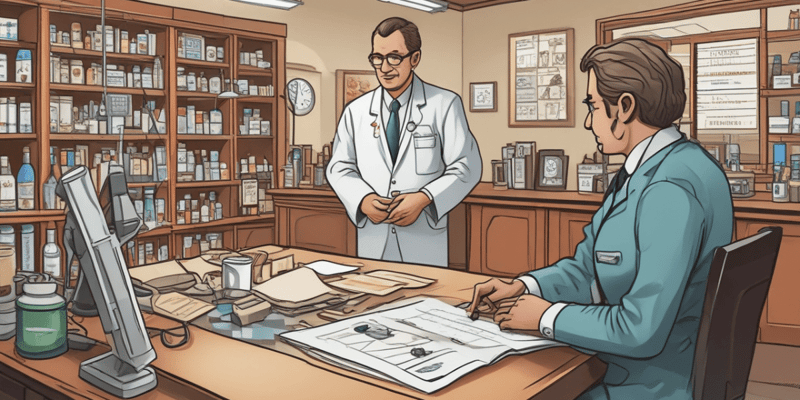Questions and Answers
What is the primary purpose of life-long learning for pharmacists?
Which of the following is a requirement for obtaining pharmacist licensure?
How often must pharmacists renew their licensure with continuing education?
What is the main distinction between pharmacy residencies and fellowships?
Signup and view all the answers
What test must all states require for pharmacist licensure?
Signup and view all the answers
Which organization monitors the performance of graduates from pharmacy schools?
Signup and view all the answers
What form of education must a pharmacist typically complete every 7 years?
Signup and view all the answers
Before applying for licensure, what should a pharmacist do regarding their state?
Signup and view all the answers
What is the primary purpose of PGY-2 residencies for pharmacists?
Signup and view all the answers
How long do PGY-2 residencies typically last?
Signup and view all the answers
Which of the following is NOT a type of PGY-2 residency?
Signup and view all the answers
What is one requirement before pursuing a PGY-2 residency?
Signup and view all the answers
What do elective rotations in a PGY-1 residency allow residents to do?
Signup and view all the answers
Which rotation is considered a longitudinal rotation in the PGY-1 schedule?
Signup and view all the answers
Which of the following rotations is part of the PGY-1 core rotations?
Signup and view all the answers
Which area of specialization is NOT included among the PGY-2 residency options?
Signup and view all the answers
What is a primary focus of the research projects conducted during PGY-1 and PGY-2 residencies?
Signup and view all the answers
What type of opportunities may some residencies offer regarding academia?
Signup and view all the answers
Which of the following is NOT a common component of a pharmacy residency?
Signup and view all the answers
What organization is primarily responsible for overseeing the accreditation of pharmacy residencies?
Signup and view all the answers
What is commonly true about the salary for pharmacy residents?
Signup and view all the answers
Which of the following statements about the ASHP Midyear Conference is correct?
Signup and view all the answers
Which benefit is typically provided to pharmacy residents?
Signup and view all the answers
What might some residents be required to do after completing their research project?
Signup and view all the answers
What are the common components required when applying to residency programs?
Signup and view all the answers
What does 'Match Day' signify in the residency application process?
Signup and view all the answers
If a student does not match on their first attempt, what is the next step available to them?
Signup and view all the answers
Which of the following positions might one hold after completing a pharmacy residency?
Signup and view all the answers
What is one significant benefit of completing a pharmacy residency?
Signup and view all the answers
What does the term 'scramble' refer to in the context of pharmacy residency applications?
Signup and view all the answers
What is a requirement for students during the interview phase of the residency application?
Signup and view all the answers
How does residency work compare to experience in the workforce?
Signup and view all the answers
What is the primary goal of a pharmacy fellowship?
Signup and view all the answers
Which of the following is NOT a recommendation for applying to a pharmacy residency?
Signup and view all the answers
What is the focus of traditional fellowships in pharmacy?
Signup and view all the answers
What is a significant difference between residencies and fellowships regarding accreditation?
Signup and view all the answers
Which of the following organizations conducts peer reviews of pharmacy fellowships?
Signup and view all the answers
What should a pharmacy student consider during their second professional year regarding residency?
Signup and view all the answers
When preparing to apply for a pharmacy residency, which of the following strategies is crucial?
Signup and view all the answers
Which statement about pharmacy residencies is accurate?
Signup and view all the answers
Study Notes
Licensure Process
- Completion of Doctor of Pharmacy (Pharm.D.) degree is essential for licensure.
- Application involves submitting transcripts and BOP forms for degree verification.
- Eligibility is determined by the state board of pharmacy; research is necessary for specific state requirements.
- National Association of Boards of Pharmacy (NABP) provides eligibility for NAPLEX; the MPJE is state-specific.
Life-long Learning and Continuous Professional Development
- Board exams and continuing education are crucial for licensure renewal every 1-2 years.
- Board certification renewal occurs every seven years.
- Participation in professional conferences fosters ongoing education and networking.
Pharmacy Residencies
- PGY-1 and PGY-2 residencies provide structured training; PGY-1 focuses on general practice, while PGY-2 allows for specialization.
- Core and elective rotations are included; elective rotations may last 2-6 weeks, while core rotations are typically 4-8 weeks.
- Research projects are mandatory in both PGY-1 and PGY-2 residencies and aim to enhance patient care and pharmacist opportunities.
- Some residencies allow residents to teach at pharmacy colleges and may offer teaching certificates.
Types of PGY-2 Residencies
- Specializations include but are not limited to cardiology, critical care, geriatrics, oncology, and mental health.
- Each PGY-2 residency lasts approximately one year.
Benefits of Residency and Fellowship
- Completing a residency significantly improves job prospects and clinical skills, equivalent to 5 years of experience.
- Fellowships focus on independent research and often prepare pharmacists for drug development roles.
- Both paths enhance the ability to acquire board certification in specific specialties.
Fellowship Overview
- Traditional fellowships emphasize research, while industry fellowships provide experience within pharmaceutical companies.
- Fellowships are not typically accredited by ASHP but can be peer-reviewed by ACCP for quality assurance.
Residency Application and Matching Process
- Competitive applications require a CV, letters of intent, and at least three letters of recommendation.
- The "match" process involves creating a ranked list of preferred residency programs, with results announced on "Match Day."
- Failure to match allows students to enter phase 2 or participate in a "scramble" for unfilled positions.
Residency Employment Opportunities
- Post-residency jobs include clinical pharmacist roles, faculty positions, and various management opportunities within healthcare systems.
- Residents often earn less than practicing pharmacists but receive medical benefits and vacation days.
Networking and Application Tips
- Engaging in pharmacy organizations and leadership roles enhances residency application strength.
- Starting to research residency programs early and networking with faculty is crucial for success.
Studying That Suits You
Use AI to generate personalized quizzes and flashcards to suit your learning preferences.
Description
Explore the essential components of pharmacist licensure, including requirements and the testing process. This quiz also delves into the importance of life-long learning and continuous professional development for pharmacists. Enhance your understanding of the journey to becoming a licensed pharmacist.




